WAR GRAVE
RONALD NORRIS (grave 22)
SERGEANT
83 SQUADRON
ABOUT MY LIFE
Born: 1918
Died: 4th November 1940
I was the Son of George Roanson Norris and Edna May Norris, of Woodsmoor, Stockport in Cheshire. The Epitaph they left on my gravestone was: Till the broken chain is whole again.
A letter from Ronald to his Mum and Dad:
|
Just a line on my birthday to thank you very much for the present and to let you know that I feel just as well today as I did 12 months ago. Just a little tired but otherwise OK. You can’t go on forever at this game and soon they will have to give us some leave or something. Remember this time last year? I was at home, and everything was so different. The war hadn’t really started, and I was just a green rookie in a new uniform. Now at times I feel like an old man but it’s those thoughts of happier days that make this worthwhile. When all this is over, I can settle down a much wiser man and I can appreciate all those things I took for granted. I remember it seems long ago when I was so carefree with not a worry in the world. Now I take everything so seriously. Maybe a change for the better but I think the care-free days were the best and when this is over, I shall get back into my stride again. This time last year I was having my last fling in the swimming pool and on the teams’ courts. The weather was just perfect as it is now. Having a good time with the ‘gang’. Sleeping on a feather bed, eating a meal as only Mum can cook and tinkering about with the ‘job’ How is the mo-bike by the way? Has it gone with the pots and pans to make Spitfires? Today being a special occasion, I took the afternoon off and I went swimming in our own pool. Its one we’ve made ourselves by blocking up the river and digging a pool in the mud. Tonight, though I must go up again and play tick with the angels. This war can’t be stopped for a birthday. I’m afraid I have no news; I never get out nowadays. Last week we were working from a base in Yorks, and I was very much tempted to slip home and play truant for a couple of days. I’m sorry to see you’re messed up at the Office, Pop but it’s good to know you are busy. How’s the army nowadays? That postal order will come in very useful, and I think I’ll buy a good cigarette lighter. Mu and Nor sent me some cigs, I’ll write to Norley later, maybe tomorrow. …… Your loving son Ron. |
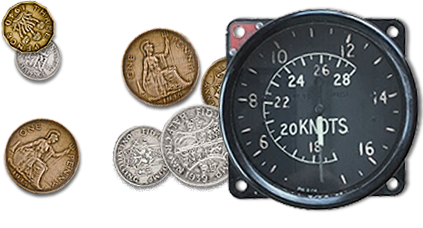
Ronald writes home to his parents:
Just a line on my birthday to thank you very much for the present and to let you know that I feel just as well today as I did 12 months ago. Just a little tired but otherwise OK. You can’t go on forever at this game and soon they will have to give us some leave or something. Remember this time last year? I was at home, and everything was so different. The war hadn’t really started, and I was just a green rookie in a new uniform. Now at times I feel like an old man but it’s those thoughts of happier days that make this worthwhile. When all this is over, I can settle down a much wiser man and I can appreciate all those things I took for granted. I remember it seems long ago when I was so carefree with not a worry in the world. Now I take everything so seriously. Maybe a change for the better but I think the care-free days were the best and when this is over, I shall get back into my stride again. This time last year I was having my last fling in the swimming pool and on the teams’ courts. The weather was just perfect as it is now. Having a good time with the ‘gang’. Sleeping on a feather bed, eating a meal as only Mum can cook and tinkering about with the ‘job’ How is the mo-bike by the way? Has it gone with the pots and pans to make Spitfires?
Today being a special occasion, I took the afternoon off and I went swimming in our own pool. Its one we’ve made ourselves by blocking up the river and digging a pool in the mud. Tonight, though I must go up again and play tick with the angels. This war can’t be stopped for a birthday.
I’m afraid I have no news; I never get out nowadays. Last week we were working from a base in Yorks, and I was very much tempted to slip home and play truant for a couple of days.
I’m sorry to see you’re messed up at the Office, Pop but it’s good to know you are busy. How’s the army nowadays? That postal order will come in very useful, and I think I’ll buy a good cigarette lighter. Mu and Nor sent me some cigs, I’ll write to Norley later, maybe tomorrow. …… Your loving son Ron.
MY AIRCRAFT
The Hampden was a medium bomber with a crew of 4. Pilot, Navigator, Wireless Operator/gunner and a further gunner. Although it was a vast improvement on the biplanes 83 Squadron had been flying just before the war opened, in reality it was already obsolete. Early daylight raids had been a disaster, the bomber was too slow to evade German fighters and its guns were no match for the Germans either. The distinctive fuselage, designed to give the aircraft a sleek, aerodynamic profile, led to the Hampden earning its nickname of “The Flying suitcase”.
Crew: 4
Span: 21.09 m
Length: 16.32 m
Height: 4.37 m
Wing area: 63.90 m²
Empty weight: 5,344 kg
Loaded weight: 8,508 kg
Engine: 2 x Bristol Pegasus XVIII 9-cylinder radial engines
Engine power: 980hp each
Maximum speed: 410 km/h
Rate of climb: 5.00 m/s
Range normal: 1,095 km
4 or 6 x 7.7mm Vickers K machine guns (1 flexible, 1 nose, 1 or 2 dorsal, 1 or 2 ventral)
1,814kg of bombs/mines or 1 x 18in torpedo
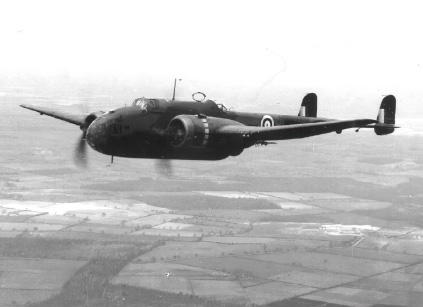
MY ROLE
I was the wireless operator on this aircraft. My job was to stay in communication with base, receive updates on things like the changing weather and to send distress messages if needed. When not on the radio, I operated the upper dorsal machine gun to defend against German fighters.
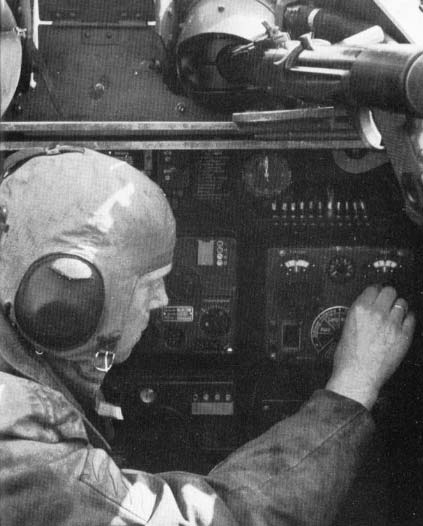
MY SQUADRON
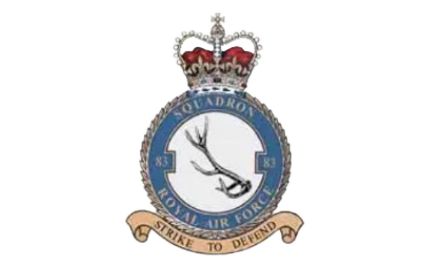
Motto: Strike to Defend
83 Squadron was formed at Montrose on 7th January 1917 as a night bomber squadron. Moving to France in March 1918, the squadron saw action on the western Front and took part in operations to counter the German’s Spring Offensive. Following the end of the war, the Squadron was disbanded on 31 December 1919.
With the threat of war once again looming over Europe, 83 squadron was reformed at RAF Turnhouse on 4th August 1936, flying the Hawker Hind biplane. In March 1938, the squadron re-equipped with Handley Page Hampdens at RAF Scampton.
In the summer of 1940, the Squadron received one of Scampton’s three Victoria Crosses due to the heroic actions of Flight Sergeant John Hannah in putting out the fire on a battle damaged Hampden.
In December 1941, the squadron re-equipped with the infamous Avro Manchester, but the poor reliability of this aircraft led to them quickly being re-equipped with the legendary Avro Lancaster, with which the squadron fought the rest of the war. In August 1942, the squadron became a pathfinder unit, leading large bomber formations to their targets and laying target indicator flares so they could be more accurately hit.
After the war, they flew Avro Lincolns and Avro Vulcans, before being disbanded in 1969.
THE ACCIDENT
I took off from Scampton In Hampden L4093 to attack the dockyards in Kiel, Germany. Our aircraft was hit by Flak (anti-aircraft guns) and we brought our crippled aircraft back towards base. Sadly we very nearly made it, but we had to ditch the aircraft in the sea, just off Spurn Point. At this time of year, the sea is so cold that unless you get into your dinghy within a couple of minutes, there is no chance of survival. All the crew of four were lost.
A letter to the family from Midshipman Benson-Dave, of HMS Vivien, the first ship to the site of the crash:
It is with deep regret that I have to write you this letter. It was this ship (HMS Vivien) that picked up the body of your son. ……..
I thought it my duty to write and give you some details of the tragedy.
At approx. 7am on Nov 4th we received a signal, stating that a bomber was down. We at once proceeded at full speed to the spot. On arriving there, we saw wreckage and patches of oil and petrol and also 2 bodies. We immediately lowered our boat hoping that we were not too late. But on the boats return, it was with great sorrow we learnt that there was no sign of life. On further examination, it was definitely known that they must have died the instant the plane crashed, and thus they could not have suffered at all. They were picked up approx. 10.30am and through various information, they must have been killed approx. 4.30am.
Well we could do nothing except pass by signal their identities to shore.
We felt it an honour to have such brave men on board, even though they had met their Master.
It is impossible to give you any consolation, except as you have already seen by the papers that this ship has begun to avenge the death of these brave men, by shooting two planes down. There are many more to come (planes)…..
The ship wishes to send its deepest sympathy to you all and I do hope this information will give you more courage
PS Your sons companion in the plane was :- Pilot Officer C A Connor DFC ( address of next of kin given )
Just two months earlier, my pilot, Flying Officer Connor had been awarded the Distinguished Flying Cross on the same mission that Sergeant John Hannah won his Victoria Cross. Their aircraft had been hit by Flak and the aircraft’s fuel had caught fire, causing a ferocious blaze which John Hannah put out with his bare hands. All the while, Connor kept flying his severely damaged aircraft, getting it safely back to base.
DFC Citation (London Gazette 8 October 1940).
Pilot Officer Clare Arthur Hovendon CONNOR (40892). Pilot Officer Connor was captain of an aircraft detailed to attack enemy barge concentrations at Antwerp one night in September, 1940. His first run over the target was inaccurate and no bombs were dropped. In the second approach, at 2,000 feet, the aircraft was subjected to intense fire from the ground, but the attack was pressed home successfully. During this attack the bomb compartment in the aircraft was shattered and a fire started which quickly spread to the wireless operator’s and rear gunner’s cockpit. The port mid-wing and the tail boom were damaged. Shell fire pierced the port rear petrol tank causing grave risk of the fire spreading, and the starboard tank was also pierced. The navigator and rear gunner abandoned the aircraft, but the wireless operator air gunner remained and succeeded in controlling, and eventually extinguishing the flames. In spite of the condition of his aircraft and knowing that he had neither a navigator, rear gunner nor normal wireless facilities, Pilot Officer Connor succeeded in flying back to his base and landing without further damage. He displayed the most outstanding coolness, courage and devotion to duty.
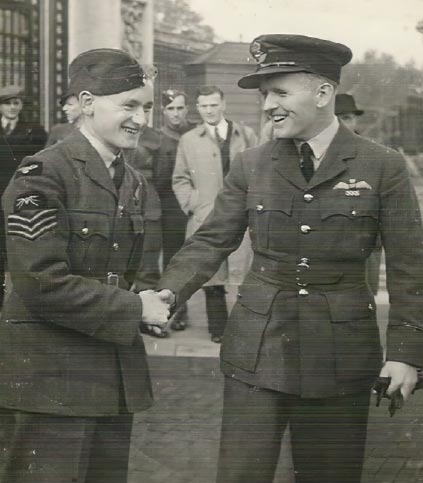
John Hannah VC with Clare Conner DFC.
CASUALTIES – 28TH SEPTEMBER 1940
Flying Officer Clare Connor DFC (Pilot) (Buried Brattleby)
Sergeant Ronald Norris (Wireless OP/Gunner) (Buried Scampton)
Sergeant James Gibson (No known grave)
Sergeant Geoffrey Stubbings (No known grave)
ON THIS DAY IN WORLD WAR TWO – 28TH SEPTEMBER 1940
The Greeks counter attack the Italians in Albania, reaching the Korce – Peratia road.
The next day, the result from the American presidential elections give Roosevelt a third term in office with a landslide victory.
Where Next
Visit the grave of my pilot, Flying Officer Clare Arthur Hovenden Connor DFC in the next village Brattleby. His grave is on the left as you walk into the churchyard.
